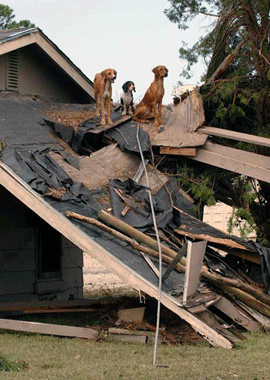Humane work and disaster planning for animals advance as Katrina anniversary nears

Five years after Hurricane Katrina, The Humane Society of the United States continues to support animal care and welfare efforts in the Gulf Coast states, and to promote disaster preparedness planning that incorporates animals.
“The Humane Society of the United States answered the call when Katrina struck, and we have been in the Gulf Coast region ever since,” said Wayne Pacelle, president and CEO of The HSUS. “We continue to fund reconstruction and other improvements to the animal care infrastructure throughout Louisiana, Mississippi, and the surrounding states. More importantly, as a result of our public policy work at all levels, the forced mass abandonment of animals that we saw during the Katrina response is now inconceivable as an element of disaster response.”
Since 2006, The HSUS has helped dozens of Gulf Coast pet friendly shelters to rebuild and to improve their management and operation. The HSUS also funded programs that resulted in the spaying and neutering of tens of thousands of pets, financed shelter medicine programs at the veterinary schools of both Louisiana State University and Mississippi University, provided money for the development of a new animal care facility at the Dixon Correctional Institute, invested in public awareness campaigns about the importance of spaying and neutering and veterinary health care, and advanced a number of anti-cruelty measures in the state legislatures of Louisiana and Mississippi.
The federal government, 16 states and the District of Columbia have taken steps to require the inclusion of animals in disaster planning protocols. Tens of thousands of pets died in New Orleans and other communities in Katrina’s strike zone because local, state, and federal authorities did not have a coherent policy that allowed pets to be temporarily held while they could be housed and fed until claimed or adopted.
See additional stories from The HSUS reflecting on hurricane Katrina and looking forward to positive changes in the Gulf Coast here and here.
Facts:
- A 2006 Zogby International poll found that 61 percent of pet owners say they would refuse to evacuate if they could not take their pets with them.
- There are over 358 million pets residing in 63 percent of American households.
- In October 2006, President Bush signed the Pets Evacuation and Transportation Standards [PETS] Act, requiring local and state emergency preparedness authorities to include pets and service animals in their evacuation plans in order to qualify for grants from the Federal Emergency Management Agency.
- The HSUS has been working with animal shelters in the wake of the Deepwater Horizon oil spill, and has delivered nearly 13 tons of pet food to struggling families and coordinated the donation of 20 tons of cat litter to the Gulf area. The HSUS also transported dogs from overburdened Louisiana shelters to the east coast where they can more readily be adopted.
- Connecticut, California, District of Columbia, Florida, Hawaii, Illinois, Louisiana, Maine, New Hampshire, New Jersey, New Mexico, Nevada, New York, Oregon, Texas, Vermont, and Virginia have all passed legislation or taken other measures to protect pets in disasters.
—
Follow The HSUS on Twitter. Seeour work for animals on your iPhone by searching “HumaneTV” in the App Store.
The Humane Society of the United States is the nation’s largest animal protection organization – backed by 11 million Americans, or one of every 28. For more than a half-century, The HSUS has been fighting for the protection of all animals through advocacy, education, and hands-on programs. Celebrating animals and confronting cruelty — On the web at www.humanesociety.org.


Speak Your Mind
You must be logged in to post a comment.